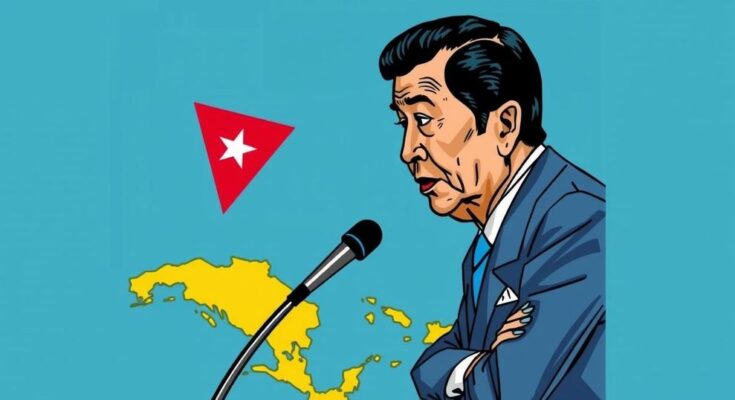Argentine President Javier Milei has replaced Foreign Minister Diana Mondino after the country voted to condemn the US embargo on Cuba at the UN, appointing Gerardo Werthein as her successor. The change reflects a significant shift in Argentina’s foreign policy, emphasizing the defense of human rights and opposition to dictatorial regimes.
In a significant shift in foreign policy, Argentine President Javier Milei has dismissed Foreign Minister Diana Mondino following the country’s vote at the United Nations to condemn the United States’ longstanding embargo against Cuba. Mondino, aged 66, will be succeeded by Gerardo Werthein, who is currently serving as Argentina’s Ambassador to the United States. Presidential Spokesperson Manuel Adorni announced this change on X, emphasizing that the new administration staunchly opposes the Cuban government while advocating for the protection of human rights and individual freedoms globally. The communiqué dispatched by the presidential office indicated an intention to audit the careers of Foreign Ministry staff to identify any individuals promoting agendas contrary to these values. This dismissal follows weeks of speculation regarding Mondino’s performance, particularly due to her absence from Milei’s international engagements. The decisive moment was the recent UN vote in which Argentina supported a resolution to end the American blockade on Cuba, considered by many as the final act leading to her termination. Shortly thereafter, President Milei retweeted a legislator’s message advocating for a government that does not condone dictatorships. In the UN Assembly, an overwhelming majority of 187 countries, excluding only the United States and Israel, supported the resolution against the embargo, marking a notable diplomatic success for Cuba. This resolution, although non-binding, demonstrates a growing regional consensus against the long-standing blockade, which has been in place for more than sixty years. Previously, it was anticipated that Milei’s government might align with US interests as has traditionally been the case for Argentina, making this reversal noteworthy. The overall context of this political maneuvering is underscored by the necessity for Cuban support in future resolutions regarding Argentina’s claim to the disputed Malvinas (Falkland) Islands.
The context of this decision revolves around Argentina’s historical foreign policy stance, which has typically favored alignment with the United States on most international issues, particularly regarding trade and diplomatic relations with Cuba. The embargo against Cuba has been a source of contention globally, with many nations criticizing it as a violation of human rights. Recently, the UN General Assembly has consistently voted against the embargo, highlighting a shift towards greater international support for Cuba. President Milei’s administration, which entered office with expectations of maintaining traditional alliances, has now taken a surprising turn by opposing the US stance and embracing a more independent, regionally-focused policy. This may have significant implications for Argentina’s diplomatic relations both within Latin America and with more powerful nations.
In summary, President Javier Milei’s decision to replace Foreign Minister Diana Mondino illustrates a pivot in Argentina’s foreign policy, particularly concerning relations with Cuba and the United States. The vote at the United Nations, which opposed the embargo on Cuba, marked a critical inflection point leading to Mondino’s dismissal. The new foreign minister, Gerardo Werthein, represents a commitment to a diplomatic approach grounded in advocacy for human rights and autonomy from historical ties to US policies. This transition speaks volumes about the Milei administration’s intentions to reshape Argentina’s foreign relations and its willingness to prioritize regional solidarity over traditional alliances.
Original Source: www.batimes.com.ar




